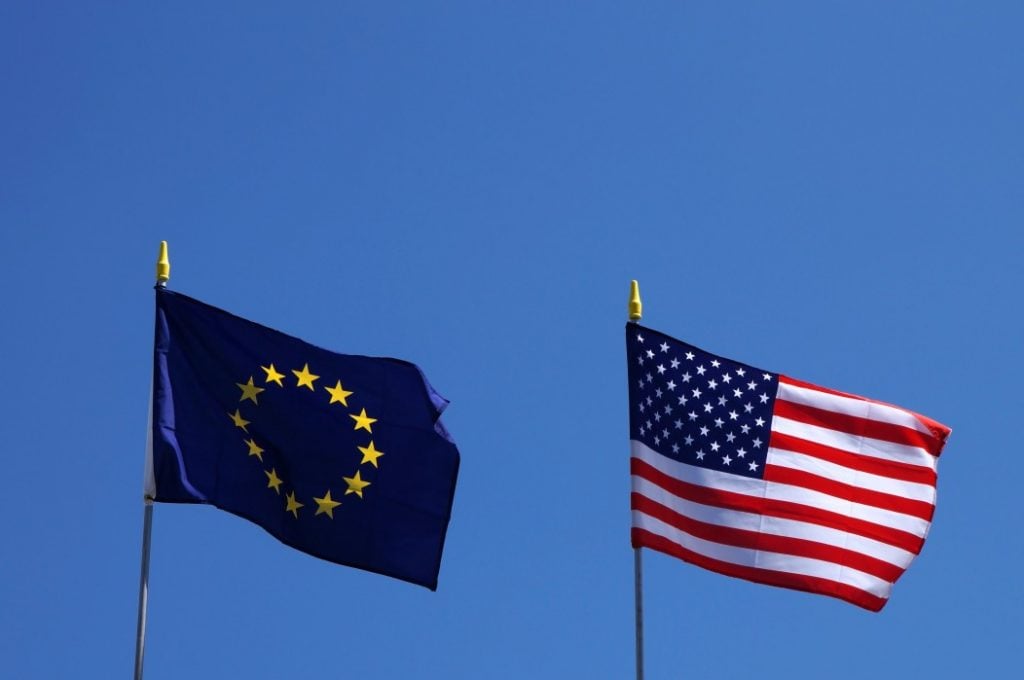Europe Outpaces U.S. in Crypto Banking, But Can It Maintain Its Lead?
11.03.2025 17:30 1 min. read Alexander Stefanov
While the U.S. grapples with crypto regulations, Europe has quietly taken the lead in integrating digital assets into its banking sector.
Over 50 European banks now offer services like custody, trading, and stablecoin transactions, making the continent the most crypto-friendly financial hub.
Circle’s Patrick Hansen highlighted this shift, noting that Europe’s early regulatory clarity—particularly through MiCA—has allowed its banks to establish a strong foundation. Meanwhile, the U.S. is still catching up, with the Office of the Comptroller of the Currency (OCC) only recently permitting banks to provide crypto custody services.
However, Europe’s dominance faces a potential challenge from the U.S., particularly with stablecoins. Pierre Gramegna of the European Stability Mechanism warned that the rise of dollar-backed stablecoins could weaken Europe’s monetary influence, especially if major tech firms integrate them into global payment networks.
Despite these concerns, European banks continue to push forward, benefiting from years of regulatory preparation. With a growing number of institutions embracing crypto, Europe remains ahead in bridging traditional finance with digital assets.
-
1
Western Union Explores Stablecoin Integration After GENIUS Act Approval
22.07.2025 10:00 2 min. read -
2
Telegram Launches TON Wallet for U.S. Users, Unlocking in-app Crypto Features
22.07.2025 17:30 2 min. read -
3
Polymarket Eyes Launching Stablecoin to Capture Reserve Profits
23.07.2025 10:30 2 min. read -
4
JPMorgan Eyes Crypto-backed Loans Amid Favorable U.S. Policy Shift
22.07.2025 9:35 2 min. read -
5
Coinbase Brings Perpetual Futures to U.S. Traders Under CFTC Regulation
22.07.2025 13:33 2 min. read
Visa Settles $200M in Stablecoin Transactions, Eyes Long-term Potential
Visa reported over $200 million in stablecoin settlements during Q2 2025, a milestone in its growing commitment to digital asset infrastructure.
Coinbase and JPMorgan Chase Partner to Expand Crypto Access for 80M+ Customers
Coinbase has announced a major partnership with JPMorgan Chase, the largest U.S. bank, aimed at expanding access to cryptocurrencies for over 80 million Chase customers.
Bank of Korea Launches New Division to Oversee Crypto and Stablecoin Developments
The Bank of Korea (BOK) has taken a significant step toward deepening its involvement in the digital asset ecosystem by establishing a dedicated virtual asset division, according to a report from local media outlet News1.
JPMorgan: Coinbase Could Gain $60B From USDC-Circle Ecosystem
A new report from JPMorgan is shedding light on the staggering upside potential of Coinbase’s partnership with Circle and its deep exposure to the USDC stablecoin.
-
1
Western Union Explores Stablecoin Integration After GENIUS Act Approval
22.07.2025 10:00 2 min. read -
2
Telegram Launches TON Wallet for U.S. Users, Unlocking in-app Crypto Features
22.07.2025 17:30 2 min. read -
3
Polymarket Eyes Launching Stablecoin to Capture Reserve Profits
23.07.2025 10:30 2 min. read -
4
JPMorgan Eyes Crypto-backed Loans Amid Favorable U.S. Policy Shift
22.07.2025 9:35 2 min. read -
5
Coinbase Brings Perpetual Futures to U.S. Traders Under CFTC Regulation
22.07.2025 13:33 2 min. read


